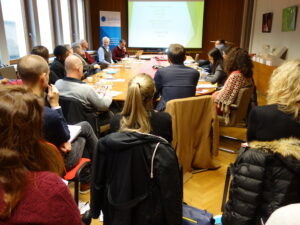Luxembourg, 28 January 2019
Judeh Jamal, CEO of DAMAN SMEs, a not for profit organisation aiming to sustain and support the microfinance sector to continue their activities in the marginalized, poor communities in Palestine, was in Luxembourg and presented to InFiNe.lu members and Luxembourg public an overview of the situation of micro and small enterprises in Gaza and West Bank.
 A decade of crisis and conflicts has affected the quality of life and well-being of Palestinian population. The political and security situation asphyxiates the Palestinian economy which remains dependent on foreign aid. According to the UN Office for the Coordination of Humanitarian Affairs (OCHA), approximately 31.5% of households in Gaza and West Bank, suffer from food insecurity (end of 2017). This is due to high unemployment, low household incomes and rising living cost. According to the statistics from the Palestinian Central Bureau of Statistics, in 2017, the Palestinian GDP rose to 3.2% and the total labor force to 18%. The economic activity in the construction sector was 4.4 % and about 3% in the agricultural sector.
A decade of crisis and conflicts has affected the quality of life and well-being of Palestinian population. The political and security situation asphyxiates the Palestinian economy which remains dependent on foreign aid. According to the UN Office for the Coordination of Humanitarian Affairs (OCHA), approximately 31.5% of households in Gaza and West Bank, suffer from food insecurity (end of 2017). This is due to high unemployment, low household incomes and rising living cost. According to the statistics from the Palestinian Central Bureau of Statistics, in 2017, the Palestinian GDP rose to 3.2% and the total labor force to 18%. The economic activity in the construction sector was 4.4 % and about 3% in the agricultural sector.
Judeh Jamal mentioned that between 150 000 and 190 000 households need a microcredit; additional 96 000 need SME credit and further 200 000 need small-balance savings accounts and money transfer services. Currently, there are 10 microfinance providers in Palestine with various legal structures and their activities are supervised by the Palestinian Monitoring Authority. Over the past five years, the microfinance institutions (MFIs) have improved its sustainability in the West Bank. However, they operated in a very difficult environment in the Gaza Strip. The war and the political decisions toward the salary cut in Gaza affected the MFI’s performance.
Judeh Jamal illustrated the Portfolio at Risk (PAR) and default loan of 2 main Palestinian MFIs for 2013-2018. By the end of 2014 the PAR increased while it started declining with some stability by the end of 2015 till July 2017. The political situation affected obviously the PAR and activities of MFIs in the region. Therefore, they is a need for a third party, such as DAMAN for SMEs Solidarity Credit Guarantee Scheme (CGS) to share the risk.
The Solidarity Credit Guarantee Scheme (CGS) mobilize resources to support Palestinian small and micro vulnerable entrepreneurs by ensuring that the MFIs continue to provide services to vulnerable group. The initiative has been developed in partnership with the Arab Centre for Agricultur Development (ACAD), the Palestinian Business Women’s Association (ASALA) and the Solidarité Internationale pour le Développement et l’Investissement (SIDI – France). DAMAN for SMEs started its project in 2008 with 2 MFIs. It is now looking to expand its outreach in the West Bank, Gaza Strip and East Jerusalem by working with new MFIs. It is currently working on a study about the MFI’s Emergency Situation in Gaza Strip which will be released soon.
Copyright: InFiNe.lu
InFiNe is the Luxembourg platform that brings together public, private and civil society actors involved in inclusive finance. The value of InFiNe lies in the wide range of expertise characterised by the diversity of its members.
With the support of

Inclusive Finance Network Luxembourg
39, rue Glesener
L-1631 Luxembourg
G.-D. de Luxembourg
Tel: +352 28 37 15 09
contact@infine.lu
R.C.S. : F 9956
Legal notice
Privacy notice
Picture 1 © Pallab Seth
